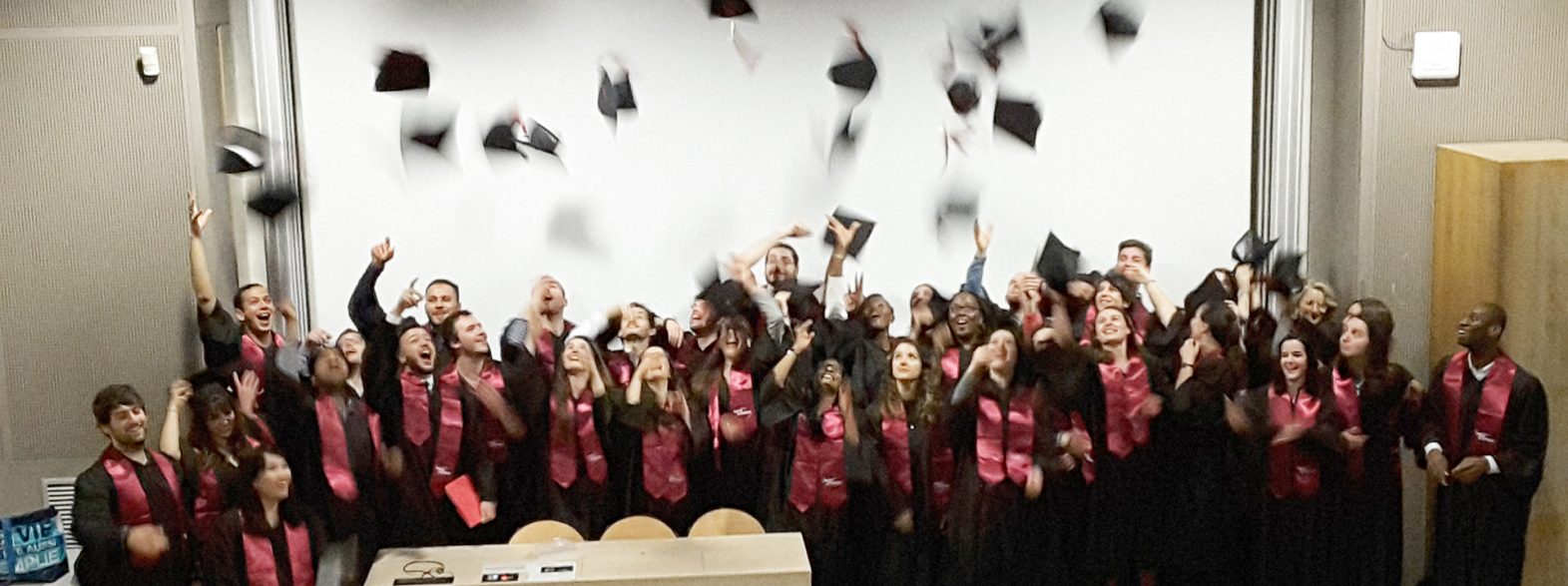Masters Program

L’Institut de physique du globe de Paris (IPGP), au sein d’Université Paris Cité est un pôle d’enseignement et de recherches de renommée internationale en sciences de la Terre et proposent le Master Sciences de la Terre, des Planètes, Environnement (STPE)
Les atouts de nos formations en Master
- 9 parcours de master dont 2 proposés en alternance sous contrat d’apprentissage ou de professionnalisation.
- Un encadrement assuré par des enseignants-chercheurs et chercheurs reconnus internationalement de l’IPGP, de l’ENS, de l’université de Paris et de nos partenaires académiques (Mines ParisTech, IGN, IFSTTAR, …) et du monde de l’entreprise.
- Une solide formation de terrain (jusqu’à 6 semaines de terrain sur l’ensemble de la formation).
- Des formations bénéficiant d’un important plateau technique.
- Entre 7 et 11 mois de stage professionnel durant la formation.
- L’adossement des formations aux équipes de recherche et des observatoires de l’Institut de physique du globe de Paris (160 chercheurs, 130 doctorants) et du Laboratoire de Géologie de l’Ecole normale supérieure (25 chercheurs, 20 doctorants) offrant une grande diversité dans les activités de recherche en géosciences ainsi que de nombreux en partenariat avec de grands groupes industriels de l’exploration et l’exploitation des ressources naturelles, de la gestion de l’environnement et des géomatériaux.
- Des partenariats à l’international avec de grandes universités (Univ. du Minnesota, Univ. de Sao Paulo, Univ. of Western Australia, EPFL, Université Ludwig-Maximilians, Institute of Technology Bandung…).
- Une offre de bourses d’études pour les étudiants internationaux.
À qui s’adressent nos formations ?
Les formations proposées s’adressent à des étudiants possédant un bon bagage scientifique en géosciences et/ou physique et/ou chimie et/ou biologie et/ou mathématiques. Les cours sont dispensés en français ou en anglais par des enseignants-chercheurs travaillant dans des laboratoires de recherche publics et privés, en France comme à l’étranger.
Les débouchés
À l’issue de ces formations, les étudiants diplômés pourront s’insérer dans le monde industriel dans des secteurs d’emplois divers des géosciences et de l’environnement et y occuper des postes de niveau ingénieur ou poursuivre (selon les spécialités) en thèse à l’Institut de physique du globe de Paris, à l’Ecole normale supérieure, ou dans un laboratoire français ou étranger.
En plus des secteurs traditionnels, de nouveaux métiers en géosciences vont se développer dans les prochaines années en réponse aux politiques publiques et à l’évolution des technologies dans des domaines aussi variés que le stockage du CO2 et des déchets nucléaires, la géothermie ou les applications satellitaires.
Les parcours du Master Sciences de la Terre et des Planètes, Environnement (STPE) :
Former aux métiers de l’environnement pour identifier et prévenir ou traiter les impacts environnementaux des activités industrielles et tertiaires.
Formation uniquement en alternance sous contrat d’apprentissage ou de professionnalisation.
Pourvus d’une large culture en techniques environnementales de diagnostic de qualité des milieux et de traitement des nuisances, les diplômés seront capables de s’insérer dans des entreprises industrielles, des bureaux d’études et des sociétés de service, chez des aménageurs publics ou privés, des gestionnaires de site, des collectivités territoriales dans des domaines variés (analyse et contrôle des pollutions dans les milieux, étude et conception de procédés et de procédures propres, efficacité énergétique, gestion et traitement des pollutions et des déchets et leurs valorisations, développement durable, application des normes environnementales et énergétiques).
Former les professionnels de demain de la prospection géophysique dans les domaines du génie civil, des ressources minérales, ou de la gestion de l’environnement.
Formation proposée en formation initiale ou en alternance sous contrat de professionnalisation au niveau M2 uniquement.
Ce parcours proposé en alternance forme aux méthodes quantitatives de la géophysique, aux méthodes de prospection, d’imageries géophysiques (sismique, électrique, électromagnétique, gravimétrique, magnétique, radar), à l’acquisition de données et leur traitement mathématique, à la modélisation des processus physiques et chimiques en les appliquant à la connaissance du sol et du sous-sol.
Former des géophysiciens de haut niveau, spécialistes des systèmes naturels et des risques associés (milieu académique ou industriel).
Cette formation vise à appréhender l’ensemble des systèmes naturels et des aléas/risques associés (séismes, volcans, glissements de terrain, glaciers, tsunamis, etc.) depuis les processus physiques mis en jeu jusqu’à leur interaction avec les forcages externes comme le changement climatique. Pour comprendre et anticiper ces systèmes complexes, des enseignements multidisciplinaires sont dispensés aux frontières entre (1) modélisation physique, théorique, et numérique des processus, (2) connaissance, mesure et surveillance des milieux naturels sur le terrain, et (3) évaluation des aléas associés. La formation par la recherche et/ou professionnalisante permet aux géophysiciens / géophysiciennes de poursuivre leur parcours en doctorat dans des universités françaises ou à l’international, ou bien d’intégrer le monde industriel ou les services de l’Etat et des collectivités territoriales, principalement dans les secteurs des risques naturels, de l’environnement, de l’énergie, de la géophysique appliquée, du génie civil, des assurances, etc.
Former des géologues de haut niveau pour le monde académique et/ou industriel.
Cette formation par la recherche repose sur l’acquisition de connaissances solides sur les concepts, outils et méthodes modernes des géosciences en général et de la géologie en particulier. Elle prévoit ainsi une familiarisation avec les techniques géologiques, géophysiques et géochimiques d’observations et de mesures utilisées pour l’étude des objets et processus géologiques. Elle permet aux géologues diplômés de poursuivre leur parcours en doctorat dans des universités françaises ou à l’international, ou bien d’intégrer le monde industriel, principalement dans les secteurs de la prospection et de la gestion des ressources naturelles, ainsi que de l’environnement.
Former des spécialistes de haut niveau en géochimie, géobiologie et géomatériaux (ressources, nouveaux matériaux, enjeux énergétiques..) qui maîtrisent les fondamentaux de ces disciplines et leurs diverses applications dans le monde académique et industriel.
Cette spécialité forme des géochimistes, géobiologistes et des spécialistes en géomatériaux (ressources, nouveaux matériaux, enjeux énergétiques..) de haut niveau maîtrisant les fondamentaux de ces disciplines et les diverses applications dans le monde industriel.
La formation proposée applique les concepts et outils de la chimie à l’étude de la Terre et de l’Univers. Elle s’appuie sur une bonne formation en physico-chimie de la matière, afin de mieux comprendre la nature et la structure des éléments chimiques et de leurs isotopes, et leurs agencements de l’échelle atomique à grande échelle (roche, fleuve, continent..), et donc les processus géologiques et anthropiques.
Cette formation permet d’étudier des processus aussi différents que l’histoire de la Terre (formation et âge du système solaire), le fonctionnement de la Terre (histoire de la différenciation en différentes enveloppes, les interactions entre les diverses enveloppes internes, de surface ou externes) ou les questions environnementales (évolution de l’environnement terrestre, matériaux, enjeux énergétiques et ressources primaires, pollution anthropique des sols et des eaux, stockage géologique des déchets, énergies).
Former des spécialistes en observation de la Terre et des planètes, du drone au satellite.
Ce parcours, proposé en partenariat avec Sorbonne Université et des grandes écoles de la région parisienne en deuxième année de master, forme des physiciens spécialistes de télédétection. Il couvre toute la chaîne de production des données (orbitographie, propagation des ondes, transfert radiatif, traitement des données et des images, modélisation physique et applications). Il permet aux étudiants de poursuivre par un doctorat en géophysique, sciences de l’environnement ou sciences appliquées. Il leur offre aussi la possibilité de s’insérer directement sur le marché de l’emploi dans les entreprises de haute technologie du secteur de l’espace et des télécommunications.
Former des spécialistes de haut niveau en géochimie environnementale.
Ce parcours forme des experts dans l’observation et la compréhension des mécanismes de transferts affectant les composés minéraux et organiques dans l’environnement. Les méthodes et outils de la chimie y sont appliqués à la géochimie, en insistant sur les stratégies d’échantillonnage, l’instrumentation de mesure de pointe et la chimiométrie. Ce programme de deuxième année de Master, à ouverture internationale, est enseigné entièrement en anglais. La formation par la recherche dispensée permet aux étudiants de poursuivre par une thèse en Environnement et Sciences de la Terre mais également d’intégrer le monde du travail dans tous les domaines où des compétences dans l’observation de l’environnement ou des milieux complexes sont requises.
Former des géophysiciens de haut niveau pour le monde académique et/ou le milieu industriel
Cette formation permet d’appréhender le système Terre dans sa globalité, depuis ses composantes profondes jusqu’à ses enveloppes externes. L’étude de ce système naturel complexe couvre différents champs disciplinaires (sismologie, magnétisme, gravimétrie, géodésie, volcanologie, tectonique, etc.), en alliant l’observation, la mesure, et la modélisation analogique et/ou numérique. La formation par la recherche permet aux géophysiciens/géophysiciennes diplômé.e.s de poursuivre leur parcours en doctorat dans des universités françaises ou à l’international, ou bien d’intégrer le monde industriel, principalement dans les secteurs de l’environnement, de l’énergie, et de la géophysique appliquée.
Invitation to cutting-edge geosciences in IPGP, open to international students
The International Master in Solid Earth Sciences (IMSES) is a one-year program set up at the second year of the European Master level (M2). Its objective is to train top-level solid-earth geoscientists in the fields of geophysics, geology or geochemistry. A maximum of 10 students coming from all over the world are admitted each year, with the possibility for non-French students to be awarded a scholarship, through Université Paris Cité SMARTS-UP scholarship scheme. A wide range of courses are available, all taught in English. Training through research work and complex problem solving allows IMSES graduates to subsequently pursue a PhD in academia or work in industry.
Le parcours du Master Risques et Environnement (RE)
Former aux métiers de l’environnement pour identifier et prévenir ou traiter les impacts environnementaux des activités industrielles et tertiaires.
Formation uniquement en alternance sous contrat d’apprentissage ou de professionnalisation.
Pourvus d’une large culture en techniques environnementales de diagnostic de qualité des milieux et de traitement des nuisances, les diplômés seront capables de s’insérer dans des entreprises industrielles, des bureaux d’études et des sociétés de service, chez des aménageurs publics ou privés, des gestionnaires de site, des collectivités territoriales dans des domaines variés (analyse et contrôle des pollutions dans les milieux, étude et conception de procédés et de procédures propres, efficacité énergétique, gestion et traitement des pollutions et des déchets et leurs valorisations, développement durable, application des normes environnementales et énergétiques).
Maquettes de nos formations de Master 23-24 (oct. 23)
Listes des UE de Master 23-24 (oct. 23)
Les fiches UE de nos formations de Master (oct. 23)
Lorem ipsum dolor sit amet, consectetur adipiscing ecxvxvxvcvxvcvlit. Ut elit tellus, luctus nec ullamcorper mattis, pulvinar dapibus leo.cv




sdgwdgwdxfgwxgvwxfgbwdxvb

Author
Job
Lorem ipsum dolor sit amet, consectetur adipiscing elit.



